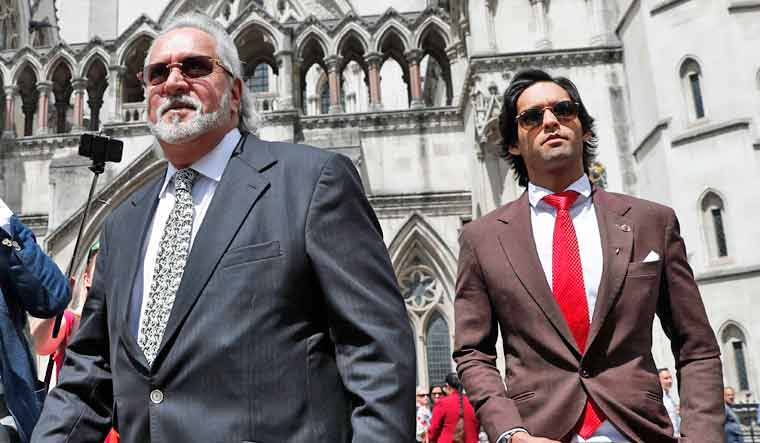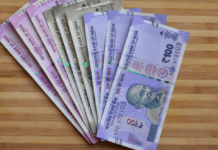LONDON: In a reprieve for Vijay Mallya, the UK High Court on Tuesday granted the embattled liquor tycoon permission to appeal against the extradition order of a lower court to face alleged fraud and money laundering charges amounting to Rs 9,000 crores in India.
A two-member bench at the Royal Courts of Justice here, comprising Justices George Leggatt and Andrew Popplewell, ruled that “arguments can be reasonably made on some aspects of the prima facie case ruling by Chief Magistrate Emma Arbuthnot in her extradition order of December 2018, which was signed off by UK home secretary Sajid Javid earlier this year.
“By far the most substantial ground is that the senior District Judge was wrong to conclude that the government had established a prima facie case, said Judge Leggatt, as he read out the ruling at the end of the hearing.
“We have been persuaded that the first ground of appeal is reasonably arguable,” he noted.
The first ground revolved around Mallya’s counsel Clare Montgomery questioning the basis on which Judge Arbuthnot had arrived at certain conclusions.
She claimed she had been “plain wrong” in accepting some of the Indian authorities’ assertions that Mallya had fraudulent intentions when he sought some of the loans for his now-defunct Kingfisher Airlines, that he made misrepresentations to the banks to seek the loans and had no intentions to pay them back.
Montgomery questioned the admissibility of some of the evidence produced by the Indian government through the Crown Prosecution Service (CPS) during the extradition trial.
“The conclusions are in effect a false dichotomy [Arbuthnot] failed to recognise that there was a straightforward business failure, said Montgomery, as she claimed the case presented by the Indian authorities had moved on in essence from that ruled upon at the magistrates’ court level.
The judges accepted her broad arguments on this particular ground and directed her to submit a draft for the appeal to proceed to a full hearing, with a time-frame to be set in the coming weeks.
They took note that the Requesting State, or the government of India, and the UK Home Secretary had chosen not to make oral representations in the case, instead choosing to submit their arguments in writing in advance.
Representatives from the Indian High Commission in London were present in court to observe the proceedings.
Mallya, accompanied by his son Siddharth and partner Pinky Lalwani, watched the proceedings in court as his counsel submitted that it is “at least arguably” that Arbuthnot fell into an error which affected her ruling in favour of an extradition order and therefore the High Court panel must grant permission to appeal in the case.
The 63-year-old later told reporters that he felt vindicated by the ruling and repeated his offer to pay back the money owed to the Indian banks.
“I still want the banks to take all their money, do what they have to do and leave me in peace, he said.
The High Court judges, however, accepted Judge Arbuthnot’s conclusions on all other aspects of the case that came up during a “lengthy” extradition trial last year, involving a “substantial volume of evidence”.
They dismissed each of the other four grounds on which permission to appeal was sought, including so-called extraneous circumstances of Mallya being pursued by the Indian authorities for political reasons.
Montgomery even invoked a purported statement by former finance minister Arun Jaitley to further this argument, claiming he was on record saying that Mallya committed the fraud on the behest of the Congress.
“It does not seem to us capable of amounting to a case without any imputed, let alone actual, political opinion attributed to the applicant [Mallya], the judges noted.
The third and fourth grounds, dealt with collectively, claimed Mallya would not receive a fair trial in India, which was also dismissed as the judges upheld Arbuthnot’s ruling on the matter that the wide media interest in the Mallya case would ensure justice.
The final ground presented by Montgomery sought to challenge the Indian government assurances that Mallya would be held in safe prison conditions at Barrack 12 in Arthur Road Jail in Mumbai, by trying to introduce new evidence from a Mr Yadav, who claimed extreme conditions at Arthur Road Jail. But the judges once again accepted Arbuthnot’s conclusion that the Indian government’s assurances should be taken at face value and disallowed an attempt to present fresh evidence on the issue of prison conditions.
Finally, Montgomery had also sought to challenge Javid’s sign off on the extradition order on speciality grounds under the India-UK Extradition Treaty. She claimed that there had been no guarantee provided from the Indian side that Mallya would not be arrested and tried for nearly 44 other cases filed against him in India if were to be extradited. But the judges ruled that no evidence had been produced to infer there would be such a “breach of speciality”.
The judges made a few interventions to indicate that the offence for which Mallya is wanted by the Indian justice system is not materially different between English and Indian law.
The ruling was a reprieve for Mallya, who has lost a UK High Court leave to appeal on paper, leading to an oral hearing of his renewal application this week.
Now that he has been granted permission to appeal, the case will proceed to a full hearing stage at the UK High Court.
Mallya remains on bail on an extradition warrant executed by Scotland Yard in April 2017. PTI







